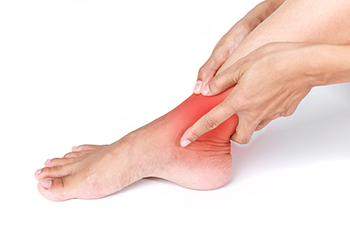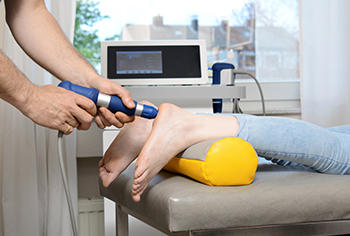Items filtered by date: September 2021
What Is Causing My Ankle Pain?
 The ankle joint is designed to support the whole body through a complex network of bones, muscles, cartilage, ligaments and tendons. Injury or disease to any one of these parts can be debilitating. One of the most common forms of ankle pain is from an ankle sprain. Ankle sprains often occur from stepping on an uneven surface or from a sporting accident that causes the ligaments connecting the bones to become partially or completely torn. Tendonitis is another common cause of ankle pain. Tendonitis occurs when the tendons, which connect the muscles to the bones, become inflamed. Arthritis, which occurs when joints become inflamed, can also lead to ankle pain. There are a variety of other sources of ankle pain, and patients who notice pain in their ankle should consult with a podiatrist for a proper diagnosis and treatment.
The ankle joint is designed to support the whole body through a complex network of bones, muscles, cartilage, ligaments and tendons. Injury or disease to any one of these parts can be debilitating. One of the most common forms of ankle pain is from an ankle sprain. Ankle sprains often occur from stepping on an uneven surface or from a sporting accident that causes the ligaments connecting the bones to become partially or completely torn. Tendonitis is another common cause of ankle pain. Tendonitis occurs when the tendons, which connect the muscles to the bones, become inflamed. Arthritis, which occurs when joints become inflamed, can also lead to ankle pain. There are a variety of other sources of ankle pain, and patients who notice pain in their ankle should consult with a podiatrist for a proper diagnosis and treatment.
Ankle pain can be caused by a number of problems and may be potentially serious. If you have ankle pain, consult with the foot specialists from Table Mountain Foot and Ankle. Our doctors will assess your condition and provide you with quality foot and ankle treatment.
Ankle pain is any condition that causes pain in the ankle. Due to the fact that the ankle consists of tendons, muscles, bones, and ligaments, ankle pain can come from a number of different conditions.
Causes
The most common causes of ankle pain include:
- Types of arthritis (rheumatoid, osteoarthritis, and gout)
- Ankle sprains
- Broken ankles
- Achilles tendinitis
- Achilles tendon rupture
- Stress fractures
- Bursitis
- Tarsal tunnel syndrome
- Plantar fasciitis
Symptoms
Symptoms of ankle injury vary based upon the condition. Pain may include general pain and discomfort, swelling, aching, redness, bruising, burning or stabbing sensations, and/or loss of sensation.
Diagnosis
Due to the wide variety of potential causes of ankle pain, podiatrists will utilize a number of different methods to properly diagnose ankle pain. This can include asking for personal and family medical histories and of any recent injuries. Further diagnosis may include sensation tests, a physical examination, and potentially x-rays or other imaging tests.
Treatment
Just as the range of causes varies widely, so do treatments. Some more common treatments are rest, ice packs, keeping pressure off the foot, orthotics and braces, medication for inflammation and pain, and surgery.
If you have any questions, please feel free to contact our office located in Wheat Ridge, CO . We offer the newest diagnostic and treatment technologies for all your foot care needs.
Treating the Causes of Plantar Fasciitis
 Plantar fasciitis is a common injury in which the plantar fascia, a ligament that runs along the bottom of the foot and connects the heel bone to the toes, becomes overstretched and inflamed. When it comes to treating this condition, the first step is to determine what has caused the plantar fascia to overstretch. Sometimes this is caused by overpronation, a walking pattern common in people with flat feet in which the foot rolls too far inwards. It may also be caused by unusually high arches in the midfoot. These issues can both be corrected using orthotics. When plantar fasciitis is caused by overuse from playing sports, running, or frequently doing exercises that put stress on the feet, taking time to rest and recover, ensuring that you are wearing the appropriate shoes, and losing excess weight can all potentially help relieve symptoms. If you are suffering from heel or arch pain, it is suggested that you seek the care of a podiatrist.
Plantar fasciitis is a common injury in which the plantar fascia, a ligament that runs along the bottom of the foot and connects the heel bone to the toes, becomes overstretched and inflamed. When it comes to treating this condition, the first step is to determine what has caused the plantar fascia to overstretch. Sometimes this is caused by overpronation, a walking pattern common in people with flat feet in which the foot rolls too far inwards. It may also be caused by unusually high arches in the midfoot. These issues can both be corrected using orthotics. When plantar fasciitis is caused by overuse from playing sports, running, or frequently doing exercises that put stress on the feet, taking time to rest and recover, ensuring that you are wearing the appropriate shoes, and losing excess weight can all potentially help relieve symptoms. If you are suffering from heel or arch pain, it is suggested that you seek the care of a podiatrist.
Plantar fasciitis is a common foot condition that is often caused by a strain injury. If you are experiencing heel pain or symptoms of plantar fasciitis, contact the foot specialists from Table Mountain Foot and Ankle. Our doctors can provide the care you need to keep you pain-free and on your feet.
What Is Plantar Fasciitis?
Plantar fasciitis is one of the most common causes of heel pain. The plantar fascia is a ligament that connects your heel to the front of your foot. When this ligament becomes inflamed, plantar fasciitis is the result. If you have plantar fasciitis you will have a stabbing pain that usually occurs with your first steps in the morning. As the day progresses and you walk around more, this pain will start to disappear, but it will return after long periods of standing or sitting.
What Causes Plantar Fasciitis?
- Excessive running
- Having high arches in your feet
- Other foot issues such as flat feet
- Pregnancy (due to the sudden weight gain)
- Being on your feet very often
There are some risk factors that may make you more likely to develop plantar fasciitis compared to others. The condition most commonly affects adults between the ages of 40 and 60. It also tends to affect people who are obese because the extra pounds result in extra stress being placed on the plantar fascia.
Prevention
- Take good care of your feet – Wear shoes that have good arch support and heel cushioning.
- Maintain a healthy weight
- If you are a runner, alternate running with other sports that won’t cause heel pain
There are a variety of treatment options available for plantar fasciitis along with the pain that accompanies it. Additionally, physical therapy is a very important component in the treatment process. It is important that you meet with your podiatrist to determine which treatment option is best for you.
If you have any questions, please feel free to contact our office located in Wheat Ridge, CO . We offer the newest diagnostic and treatment technologies for all your foot care needs.
Should I See a Doctor for My Heel Pain?
 Heel pain is one of the most common conditions podiatrists help treat, and it can have a variety of causes. Common causes of heel pain include plantar fasciitis, Achilles tendonitis, bursitis, a ruptured Achilles tendon, or a heel fracture. There are a few key signs that your heel pain may be serious and needs to be checked by a podiatrist. If the pain continually worsens, stops you from doing daily activities, has not improved after a couple of weeks, or causes a tingling sensation in the heel, there may be a more serious issue at play that should be checked by a podiatrist. If the pain is severe, hinders your ability to walk, or was accompanied by a popping sensation at the time of injury, these may be signs of an even more serious injury that should be treated immediately.
Heel pain is one of the most common conditions podiatrists help treat, and it can have a variety of causes. Common causes of heel pain include plantar fasciitis, Achilles tendonitis, bursitis, a ruptured Achilles tendon, or a heel fracture. There are a few key signs that your heel pain may be serious and needs to be checked by a podiatrist. If the pain continually worsens, stops you from doing daily activities, has not improved after a couple of weeks, or causes a tingling sensation in the heel, there may be a more serious issue at play that should be checked by a podiatrist. If the pain is severe, hinders your ability to walk, or was accompanied by a popping sensation at the time of injury, these may be signs of an even more serious injury that should be treated immediately.
Many people suffer from bouts of heel pain. For more information, contact the foot specialists of Table Mountain Foot and Ankle. Our doctors can provide the care you need to keep you pain-free and on your feet.
Causes of Heel Pain
Heel pain is often associated with plantar fasciitis. The plantar fascia is a band of tissues that extends along the bottom of the foot. A rip or tear in this ligament can cause inflammation of the tissue.
Achilles tendonitis is another cause of heel pain. Inflammation of the Achilles tendon will cause pain from fractures and muscle tearing. Lack of flexibility is also another symptom.
Heel spurs are another cause of pain. When the tissues of the plantar fascia undergo a great deal of stress, it can lead to ligament separation from the heel bone, causing heel spurs.
Why Might Heel Pain Occur?
- Wearing ill-fitting shoes
- Wearing non-supportive shoes
- Weight change
- Excessive running
Treatments
Heel pain should be treated as soon as possible for immediate results. Keeping your feet in a stress-free environment will help. If you suffer from Achilles tendonitis or plantar fasciitis, applying ice will reduce the swelling. Stretching before an exercise like running will help the muscles. Using all these tips will help make heel pain a condition of the past.
If you have any questions please contact our office located in Wheat Ridge, CO . We offer the newest diagnostic and treatment technologies for all your foot and ankle needs.
The Healing Science of Sound Waves
Although the term “shockwave therapy” may sound a little off putting, the science behind it has been used for decades in effective, sound wave treatment for kidney stones (Shockwave Lithotripsy). In soft tissue repair, Extracorporeal Shockwave Therapy (ESWT) has been FDA approved for treating plantar fasciitis—a leading cause of heel pain. ESWT uses high-energy acoustic sound wave impulses to break up scar tissue, reduce pain, and stimulate healing in the damaged and inflamed plantar fascia tissues. ESWT is non-invasive, safe, and effective. If you have persistent pain in your heels, contact a podiatrist for an examination and diagnosis, and to explore whether ESWT may be an option for you.
Shockwave therapy is a treatment commonly used to treat various injuries and conditions, particularly plantar fasciitis in the feet. To learn more, consult with the foot specialists from Table Mountain Foot and Ankle. Our doctors can provide the care you need to keep you pain-free and on your feet.
Shockwave Therapy
Shockwave therapy is a new treatment option designed to treat bone conditions such as tennis elbow, shoulder pain, and others. Shockwave therapy uses high intensity sound waves that are directed to the affected tissues of the body with pinpoint accuracy. The effects are very beneficial, leading to a production of collagen fibers, eliminating inflammation.
Who Benefits from Shockwave?
Shockwave is recommended for patients suffering from heel pain and associated problems. Heel pain is a common condition which can be caused by obesity, overexertion, and spending a substantial amount of time on hard floors with your feet exposed and unsupported.
Fast and Easy
The therapy is actually a simple process that can leave patients feeling better the very next day. Shockwave therapy is not as dramatic as it sounds. It enables more blood flow to effected areas, addressing the source of the problem and allowing treatment to last for a long time.
Treatment & Recovery Time
Shockwave treatment will enable your feet to recover quickly. This is especially important since surgery is not required. It is cost effective and does not require the use of anesthesia. This treatment is a better option to surgery, since it is proven safe.
If you have any questions, please feel free to contact our office located in Wheat Ridge, CO . We offer the newest diagnostic and treatment technologies for all your foot and ankle needs.


